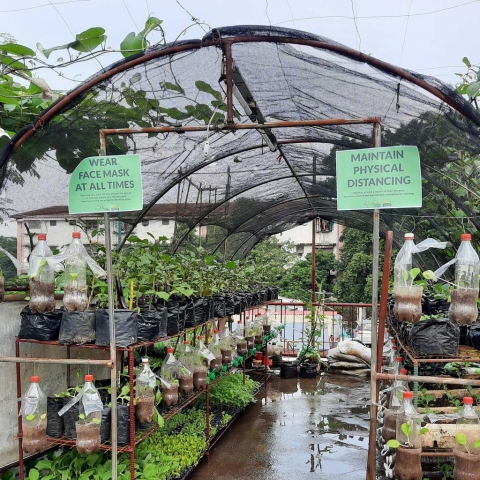With limited resources, the community used recycled plastic bottles and polybags as planting containers. According to them, this is their contribution to waste management.
QUEZON CITY, Philippines – In a limited space atop a small building, a healthy vegetable garden provides fresh and nutritious food for the residents of Base MRB Compound in Barangay Commonwealth.
Situated in the middle of a parking lot and surrounded by tenement buildings, this site has inadequate space to cultivate plants due to the coverage of concrete that extends to the roads, pavements, and even vacant lots. With care for the environment in mind, the community used recyclable plastic containers to plant fruits, vegetables, and trees and convert this somber place into a verdant and sustainable space.
With limited knowledge and resources to sustain an urban garden, the community partnered with the Agricultural Training Institute (ATI) for the garden establishment. Under the “Plant Plant Plant” initiative of the Department of Agriculture, ATI delivered agricultural inputs such as garden tools, seeds, seedlings, vermicast, and garden soil. The Institute also provided technical expertise and advice on farm implementation, pest management, and post-harvest management.
To mark the successful establishment of the community garden, a launching of the project Urban Agriculture Program at Base MRB Compound, Barangay Commonwealth, Quezon City was organized last August 20, 2020. However, due to the Enhanced Community Quarantine (ECQ) restrictions, the event was only participated by representatives from ATI, Barangay Local Government Unit, and coordinators from the community.
Homer C. Plan, the Unit Coordinator of Base MRB Compound share, “You have given us joy. When we plant, the community becomes happy because it gives us something to do, and it helps us inspire other households to grow their food.”
Meanwhile, the Barangay Kagawad and Chairman of the Committee on Urban Farming, Roberto Albao, stressed the importance of partnership. “Rest assured that we will strengthen the drive of urban agriculture, especially because this can provide food and livelihood in our community,” he said.
During the launching, 50 starter kits were distributed to selected households as start-up projects for their respective urban gardens. Additional inputs were also provided to improve the community garden.
The community plans to make the garden site as a source of seeds and seedlings that they can distribute to the households. It envisions to transform further every available space in the tenement houses surrounding the urban garden site into sources of food and livelihood through urban agriculture.

